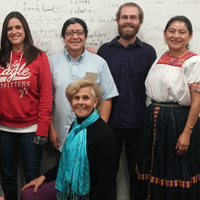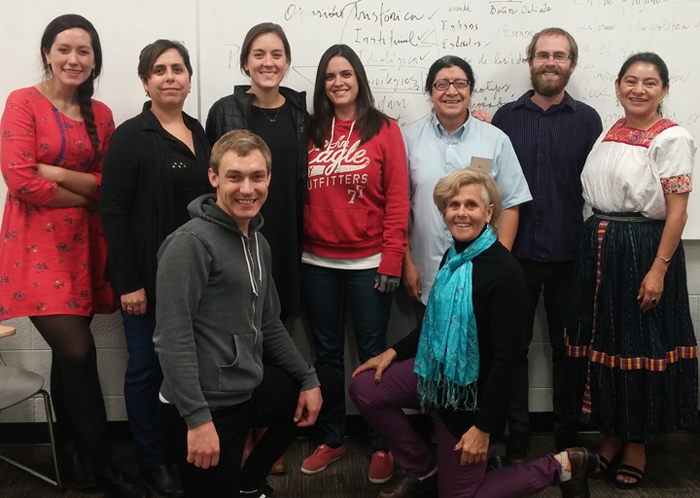
Dr. Isabel Dulfano peppers conversations with literary references. She is a literature scholar after all, albeit one with an MBA. An associate professor in Languages and Literature and a Global Change & Sustainability Center (GCSC) faculty affiliate, Dulfano represents the GCSC’s interdisciplinary ethos. Read on to learn more about her expertise in the GCSC’s Nature and Culture research theme, her current projects, and her participation in the GCSC.

Dulfano’s sustainability-related work and research explores the ties between indigenous feminism and anti-globalization. She describes her work as “thinking about development models in ways that incorporate some of the basics of ‘good life’ and alternative epistemologies.”
The “good life” that she is referencing is sumak kawsay; a system of knowledge and living rooted in the interrelation of humans and nature and intangible cultural heritage. The phrase comes from the Quechua, an indigenous people group in South America. Sumak kawsay (buen vivir in Spanish) is enshrined in both Ecuadorian and Bolivian constitutions. Dulfano’s research centers on sumak kawsay and other, related indigenous epistemologies. She particularly focuses on feminist indigenous epistemologies from below our border, centering these ways of knowing in her Indigenous Peoples Cultural and Social Perspectives course.
“The course I teach is on the one hand about legal challenges the indigenous face – and how their rights are or are not inscribed in constitutions in various countries,” Dulfano explained. “It’s also about natural resource management of their property – intellectual and physical, and it’s about why indigenous people are the ones who are dying on the front lines protecting our natural environment from the pipeline to the Amazon basin. Why are they out there? Well, part of it has to do with their own survival – physical, cultural, and economic and protection of their lands and cultural heritage. All of which has to do with sustainability. They are out there also because it’s just a fundamental part of the way that they understand a good, healthy, productive life – seeing people as part of the environment (not separate) and our need to protect and safeguard the environment now for the future.”
In Dulfano’s course, graduate and undergraduate students understand these ways of knowing and their distinction from western-based epistemologies by analyzing diverse texts such as Ecuador’s constitution and pop culture images. Dulfano hopes the course causes students to reframe a dominant western imagination around indigenous people, particularly indigenous women. For Dulfano, the shape of the dominant imagination is outlined by appropriation, sexualization, and violence. Through analyzing a variety of texts, the class critically considers and dismantles problematic stereotypes.
As part of the course, along with the support of the prestigious Dee Grant, Dulfano has brought a series of indigenous women speakers to the U. These speakers help the students conceptualize the ways in which indigenous people speak about themselves and their ways of living. Indigenous peoples’ right to cultural sustainability is an issue at the heart of Dulfano’s work.
Dulfano explained, “Cultural sustainability means that we value [cultural] diversity and that we find ways to revitalize, resuscitate, recover, or even just preserve the unique cultures, knowledge, and traditions of all people.” Preservation doesn’t mean a static, essentialized view of ‘traditional’ food, dance, dress, or language. Rather, cultural sustainability implies active investment in supporting a community’s ability to tell its stories. Investing in cultural sustainability is an act of revitalization.
Dulfano is currently participating in an ongoing cultural revitalization project in Yaxunah, a small indigenous Mayan community in the Yucatan region of Mexico. While presenting this work, she has increasingly found herself in sustainability-themed conferences. All this sustainability discourse inspired her to seek out the Global Change and Sustainability Center. Through the GCSC, she learned about the Wasatch Experience – an initiative offered by the Sustainability Office – and became a participant in the year-long experience.
“When I heard about the Wasatch Experience, I thought I wanted to explore this a little bit more, and also figure out where and how to include the humanities [in the GCSC].” Dulfano continued, “I really loved the Wasatch Experience. It’s one of the coolest things I’ve done here… (it) changed the way that I taught my class.”
Being part of the Wasatch Experience and the Global Change and Sustainability Center has confirmed Dulfano’s belief that culture and sustainability are intimately entwined. In order to imagine and create a sustainable future, she believes we need a different way of life and learning. Perhaps the indigenous concepts, scholars, and communities that Dulfano engages must inform this new way.
“What is sustainability?” she asked. “Right now we’re not living in a sustainable manner. Sustainability is imagining a whole other version of what does not exist; it’s going to cross all of these boundaries that compose academia and western knowledge… Indigenous peoples don’t see themselves as little islands, they see the world in very interrelated and interconnected ways and they see the issues that impact their particular cultures through a local lens, but also through a global lens. That’s important for beginning to think creatively about the global challenges we face.”
